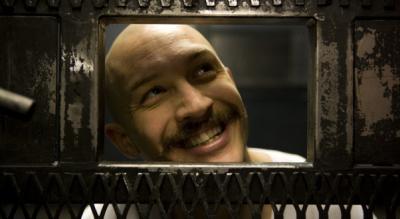Bronson

A gentle soul, trapped in the body of an absolute lunatic
dir: Nicolas Winding Refn
I thought I’d seen everything. But then I saw Bronson.
In some ways, it’s one of the strangest movies I’ve ever seen. That it is based on a true story is almost immaterial, since it’s still highly fictionalised and hyper stylised as well. And there isn’t really any story or plot, which itself is less interesting that the rendering of it, because there’s only so much you can do or say about a person as remarkable as Michael Peterson, sorry, I meant Charlie Bronson.
Though it is a biopic, it’s not a biography of legendary dead actor Charles Bronson, whose Death Wish films, numbers I to V, brought sensitivity and nuance to the debate regarding crime, immigration and vigilantism in modern America. No, this flick is about an absolutely incompetent career criminal who is clearly insane and who elects to call himself Charlie Bronson. He is still alive, so I better be careful what I say.
Not that he’s ever likely to see the light of day.
- Read more about Bronson
- 4528 reads